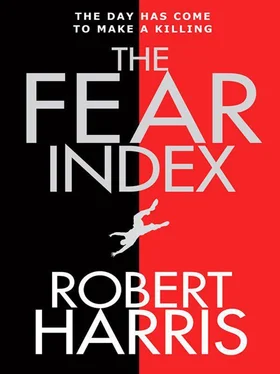Robert Harris - The Fear Index
Здесь есть возможность читать онлайн «Robert Harris - The Fear Index» весь текст электронной книги совершенно бесплатно (целиком полную версию без сокращений). В некоторых случаях можно слушать аудио, скачать через торрент в формате fb2 и присутствует краткое содержание. Жанр: Триллер, на английском языке. Описание произведения, (предисловие) а так же отзывы посетителей доступны на портале библиотеки ЛибКат.
- Название:The Fear Index
- Автор:
- Жанр:
- Год:неизвестен
- ISBN:нет данных
- Рейтинг книги:4 / 5. Голосов: 1
-
Избранное:Добавить в избранное
- Отзывы:
-
Ваша оценка:
- 80
- 1
- 2
- 3
- 4
- 5
The Fear Index: краткое содержание, описание и аннотация
Предлагаем к чтению аннотацию, описание, краткое содержание или предисловие (зависит от того, что написал сам автор книги «The Fear Index»). Если вы не нашли необходимую информацию о книге — напишите в комментариях, мы постараемся отыскать её.
The Fear Index — читать онлайн бесплатно полную книгу (весь текст) целиком
Ниже представлен текст книги, разбитый по страницам. Система сохранения места последней прочитанной страницы, позволяет с удобством читать онлайн бесплатно книгу «The Fear Index», без необходимости каждый раз заново искать на чём Вы остановились. Поставьте закладку, и сможете в любой момент перейти на страницу, на которой закончили чтение.
Интервал:
Закладка:
Hoffmann slowed his pace, trying to get his bearings. He must have run almost to the Cornavin railway station, he realised, and into the red-light district. Finally he stopped outside a boarded-up nightclub covered in a flaking skin of peeling fly-posters: Le Black Kat (XXX, FILMS, GIRLS, SEX). Wincing, his hands on his hips, a sharp pain in his side, he leaned over the gutter trying to recover his breath. An Asian prostitute watched him from a shop parlour window no more than three metres away. She wore a black corset and stockings and sat cross-legged on a red damask chair. She recrossed her legs, smiled and beckoned to him until abruptly some unseen mechanism drew a blind across the scene.
He straightened, conscious of being observed by the girls and their pimps. One rat-faced man, a bit older than the others, with pockmarked skin, was looking at him and talking into a mobile. Hoffmann set off back the way he had come, scanning the alleys and courtyards on either side in case the man had slipped into one of them to hide. He passed a sex shop, Je Vous Aime, and retraced his steps. The window contained a halfhearted display of merchandise: vibrators, wigs, erotic underwear. A pair of crotchless black panties was stretched out and pinned up on a board like a dead bat. The door was open, but the view of the interior was obscured by a curtain of multicoloured plastic strips. He thought of the handcuffs and ball gag the intruder had left behind. Leclerc had said they might have come from such a place.
Suddenly his mobile chimed with an incoming text: ‘Rue de berne 91 chambre 68’.
He stared at it for several seconds. He had just passed the Rue de Berne, had he not? He turned around and there it was, right behind him, close enough to read the blue street sign. He checked the message again. The sender was not identified; the originating number was unavailable. He glanced around to see if anyone was watching him. The fronds of plastic fluttered and parted. A fat, bald man wearing braces over a dirty vest emerged.
‘ Que voulez-vous, monsieur? ’
‘ Rien.’
Hoffmann walked back up the street to the Rue de Berne. It was long and shabby but at least it was busier – two lanes, with tram cables strung above – which made him feel safer. At the junction was a fruit and vegetable shop offering an outdoor display, next to it a forlorn little cafe with a few empty aluminium chairs and tables set out on the pavement, and a tabac advertising ‘ Cartes telephoniques, Videos X, DVDs X, Revues X USA ’. He checked the street numbers. They ascended to his left. He walked, counting them off, and within thirty seconds had migrated from northern Europe and entered the southern Mediterranean: Lebanese and Moroccan restaurants, swirls of Arabic script on the shop fronts, Arabic music blaring from tinny speakers, a smell of greasy hot kebabs, which turned his stomach; only the freakish absence of litter betrayed that this was Switzerland.
He found number 91 on the northern side of the Rue de Berne, opposite a shop selling African clothes – a dilapidated seven-storey building of peeling yellow stucco, perhaps a hundred years old, with metal-shuttered windows painted green. The building was four windows wide, its name spelt out down the side, almost from top to bottom, by individual letters protruding over the street: HOTEL DIODATI. Most of the shutters were closed, but a few were half-raised, like drooping eyelids, the interiors hidden by a greyish-white cataract of thick net curtains with a floral design. At street level there was an ancient and heavy wooden door that reminded Hoffmann incongruously of Venice; it was certainly older than the building, and elaborately carved with what looked like masonic symbols. As he watched, it swung inwards and from the dim interior a man emerged wearing jeans and trainers, with a hood pulled over his head. It was impossible to see his face. He put his hands in his pockets, hunched his shoulders and set off down the street. A minute or so later the door opened again. This time it was a woman, young and thin, with fluffy dyed orange hair and a short black-and-white-checked skirt. She was carrying a shoulder bag. She paused on the doorstep and opened the bag, searched it, retrieved a pair of sunglasses, put them on and then moved off in the opposite direction to the man.
There was never a moment when Hoffmann made a definite decision to go in. He watched for a while, and then he crossed the road and lingered outside the door. Eventually he pushed it open and peered inside. The place had a stale smell, emphasised rather than disguised by a joss stick burning somewhere. There was a small lobby with a counter, deserted, and a seating area with a black and red sofa with wooden legs and matching armchairs. In the gloom a small aquarium glowed brightly but it seemed devoid of fish.
Hoffmann took a few steps over the threshold. He reasoned that if he was challenged, he could say he was looking for a room: he had money in his pocket, he could pay for it. They probably rented by the hour. The thick door closed behind him, cutting off the sounds of the street. Upstairs someone was moving around, music was playing; the thump of the bass line shook the thin partitions. He moved through the empty reception, across a floor of curling linoleum, and followed a narrow passage to a small elevator. He pressed the call button and the doors opened immediately as though it had been waiting for him.
The elevator was tiny, lined with scratched grey metal like an old filing cabinet, with just about enough room for two people, and when the doors closed Hoffmann was almost overwhelmed by claustrophobia. The buttons offered him a choice of seven floors. He pressed number six. A distant motor whined, the elevator rattled and he began to rise very slowly. It was not so much a sense of danger he felt now as of unreality, as if he were back in a recurrent childhood dream he could not quite remember, from which the only way to wake was to keep on going until he found the exit.
The elevator ride seemed to go on a long time. He wondered what might be waiting at the end of it. When at last it did halt, he put up his hands to protect himself. Jerkily the doors opened on to the sixth floor.
The landing was deserted. He was reluctant to step out on to it at first, but then the doors began to close and he had to thrust his leg out to save himself from being reimprisoned. The doors juddered back and he moved out cautiously on to the landing. It was darker than in the lobby. His eyes had to readjust. The walls were bare. There was the same stale, almost fetid smell of air that had been breathed a thousand times and never refreshed by an open door or window. It was hot. Two doors were opposite him; more led off the passages to either side. An amateurish sign composed of movable coloured plastic letters, of the kind sold in toyshops, indicated that Room 68 was to the right. The clank of the elevator motor restarting behind him made him jump. He listened to the car descend all the way to the bottom. When it shut off, there was silence.
He took a couple of paces to the right and peered slowly around the corner along the passage. Room 68 was at the far end, its door closed. From somewhere close by came a rhythmic noise of rasping metal, which at first he mistook for sawing but almost immediately realised was bedsprings. There was a thump. A man moaned as if in pain.
Hoffmann pulled out his mobile, intending to call the police. But, curiously for the centre of Geneva, there was no signal. He put it back in his pocket and walked warily to the end of the passage. His eyes were at exactly the same level as the bulging opaque glass of the spyhole. He listened. He couldn’t hear anything. He tapped on the door, then put his ear to the wood and listened again. Nothing: even the neighbour’s bedsprings had ceased to creak.
Читать дальшеИнтервал:
Закладка:
Похожие книги на «The Fear Index»
Представляем Вашему вниманию похожие книги на «The Fear Index» списком для выбора. Мы отобрали схожую по названию и смыслу литературу в надежде предоставить читателям больше вариантов отыскать новые, интересные, ещё непрочитанные произведения.
Обсуждение, отзывы о книге «The Fear Index» и просто собственные мнения читателей. Оставьте ваши комментарии, напишите, что Вы думаете о произведении, его смысле или главных героях. Укажите что конкретно понравилось, а что нет, и почему Вы так считаете.










